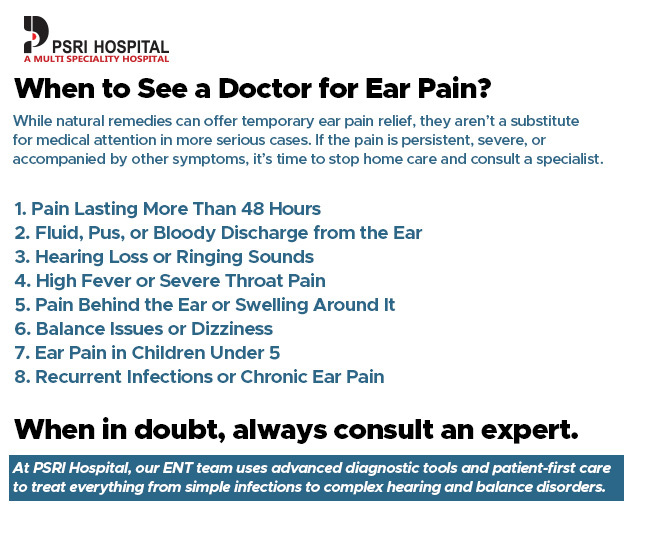How to Stop Ear Pain at Home: Natural Remedies That Actually Work

Ear pain can strike suddenly while chewing, after a swim, or late at night when lying down. For many, it’s a sharp, throbbing discomfort that makes even small tasks feel exhausting. At PSRI Hospital, we frequently see patients both adults and children, experiencing these symptoms, especially during changing weather or post infection recovery.
But not all ear pain needs antibiotics or urgent procedures. In fact, in many mild or early cases, natural earache remedies can bring real relief right at home if used correctly and safely.
In this blog, our best ENT Doctor in Delhi NCR share medically backed advice on:
- Proven home remedies for ear pain that can be used safely
- How to manage ear pain in adults and children without overmedicating
- What helps with inner ear pain, blocked ears, or pain behind the ear
- When a simple remedy is enough and when to see a doctor
Let’s start by understanding what could be causing your discomfort, so you can choose the right approach.
7 Home Remedies for Ear Pain That Actually Work
Not all ear pain requires antibiotics or hospital visits especially in its early stages. These home remedies for ear pain are safe, doctor recommended, and effective for managing mild discomfort.
1. Warm Compress for Earache
A warm compress improves blood flow, eases inflammation, and provides comfort from throbbing or dull ear pain. It’s especially helpful for middle ear infections or pain due to congestion.
How to use it:
- Dip a clean cloth in warm water, wring out excess water
- Apply over the affected ear for 10-15 minutes
- Repeat every few hours as needed
2. Cold Compress or Alternating Temperature Therapy
If the pain comes with swelling or trauma like after a loud sound or mild injury, a cold compress can numb the area.
How to use it:
- Wrap ice in a soft cloth, apply for 10 minutes
- Alternate with a warm compress for better circulation
Tip: Never place ice directly on the skin.
3. Garlic Oil for Ear Infection
Garlic contains allicin, a natural antimicrobial compound. Garlic oil for ear infection is often used for its mild antibacterial and soothing effect.
How to use it:
- Slightly warm garlic infused oil available at pharmacies or prepared at home
- Apply a few drops on a cotton ball and place it near the outer ear, not deep inside
Note: Do not use it if there’s discharge, bleeding, or a ruptured eardrum.
4. Olive Oil for Ear Pain
Olive oil for ear pain is a classic remedy to soften hardened earwax and soothe irritated skin in the outer canal.
How to use it:
- Warm olive oil slightly and test the temperature on the wrist
- Tilt the head and place 2-3 drops in the affected ear
- Stay in position for 5-10 minutes before draining gently
Note: Do not use it if you suspect a perforated eardrum or infection.
5. Hydrogen Peroxide in Ear
Useful for breaking down earwax buildup, this remedy is often suggested for blocked ear home remedy use.
How to use it:
- Use 3% hydrogen peroxide
- Lie on your side, apply 2-3 drops, and wait for bubbling
- Let it sit for 5 minutes before draining
Caution: Not suitable for children or if the ear is infected or draining fluid.
6. Jaw Movements & Neck Stretches
Sometimes, pain stems from pressure imbalance or jaw tension. Gentle stretches and movements can ease pressure and improve Eustachian tube drainage.
How to do it:
- Rotate your jaw slowly, open and close your mouth
- Tilt your head side to side and forward
- Yawning and swallowing also help open the inner ear passages
7. Sleep Adjustments & Head Elevation
For those experiencing earache while sleeping or best ear pain remedy at night, posture matters.

What helps:
- Sleep with your head elevated using 1-2 pillows
- Avoid lying on the painful side
- Use a warm compress before bed
This helps drain fluid naturally and reduces nighttime pain.
All these Natural Remedies for ear pain can offer effective relief when you use them correctly and at the right time. These are some of the best at-home options our specialists recommend. However, if you’re unsure about the cause or the pain continues for more than a day or two, we highly recommend consulting our ENT experts without any delay.
What’s Causing Your Ear Pain? Don’t Ignore the Clues
Before you try any remedy, it’s important to understand why your ear hurts. Ear pain, or otalgia, can have multiple triggers and the right treatment depends on the root cause. Here are some of the most common reasons we treat at PSRI Hospital:
1.1 Ear Infections – Otitis Media or Externa
Infections are the most common cause of ear pain in children and adults.
- Middle ear infections (Otitis Media) often follow a cold or sinus issue.
- Outer ear infections (Swimmer’s Ear) are caused by trapped moisture and bacterial growth.
You may experience throbbing pain, fullness, or mild fever. In such cases, home remedies like a warm compress for earache can offer short term comfort until medical help is needed.
1.2 Blocked Ears or Pressure Build-Up
Feeling of fullness or popping? This often happens due to:
- Sudden altitude changes
- Sinus congestion
- Allergies or seasonal flu
The Eustachian tube, which balances pressure, can become clogged causing discomfort and muffled hearing.
Try jaw movements, steam inhalation, or sleeping with your head elevated to relieve ear pressure naturally.
1.3 Earwax Buildup
Earwax protects the ear but too much can block the canal and lead to pain or temporary hearing loss.
A few drops of hydrogen peroxide in the ear may help soften wax if there’s no discharge or injury. Avoid inserting cotton swabs as they can push wax deeper or cause damage.
1.4 Trapped Water or Moisture – Swimmer’s Ear
Water that stays inside the ear after a shower or swim can irritate the skin, especially in children. This leads to itching, mild swelling, or outer ear pain.
Dry the ear gently with a towel and tilt your head to drain trapped water. Avoid using ear buds.
1.5 Night-Time Ear Pain
Many people experience earache while sleeping, especially if they have a cold, sinus issue, or fluid buildup.
Try sleeping on the opposite side and use an extra pillow to keep your head elevated. This improves drainage and can be the best ear pain remedy at night.
1.6 Pain Referred from Jaw or Throat Issues
Sometimes, ear pain and sore throat happen together especially during viral infections or if there’s jaw tension like TMJ issues. This is referred pain, not a direct ear problem.
A warm compress and hydration may help, but seek ENT evaluation if the pain is persistent.
Now that you understand what causes ear pain, let’s explore How to Stop Ear Pain at Home using safe, natural remedies recommended by our ENT experts
Conclusion: Take Control of Ear Pain, The Right Way
Ear pain is your body’s way of saying something needs attention, don’t ignore it. While many cases can be managed at home with safe and natural remedies, it’s just as important to recognise when to stop self-treatment and seek expert care.
At PSRI Hospital, the best hospital in South Delhi, our ENT specialists help you make that decision confidently with the right diagnosis, evidence based advice, and personalized care. Whether it’s ear pain in adults or safe remedies for children, we are here to help at every step.
Still in pain or unsure if it’s serious? Don’t wait. Book a consultation with our ENT experts at PSRI Hospital, Delhi today.
FAQ’s
Can I use ear drops for pain relief at home safely?
Ans. Yes, but only if there’s no ear discharge or suspected eardrum damage. Use over-the-counter ear drops strictly as directed and discontinue if irritation occurs.
Will hydrogen peroxide in the ear remove wax safely?
Ans. Hydrogen peroxide can help soften earwax when used correctly, but it should only be used if there is no active infection, discharge, or perforation. Discontinue use if you feel pain or burning.
How do I relieve ear pressure from altitude or congestion?
Ans. Yawning, swallowing, chewing gum, steam inhalation, and sleeping with your head elevated can help relieve inner ear pressure caused by colds, allergies, or changes in altitude.
How long should I try home remedies before seeing a doctor for ear pain?
Ans. Most mild cases of ear pain should improve within 2 to 3 days. If the pain doesn’t reduce or gets worse, it’s best to consult an ENT specialist to rule out infection or other underlying issues.
What symptoms with ear pain should prompt immediate evaluation?
Ans. You should seek medical attention if you experience:
Fever along with ear pain
Fluid, pus, or blood discharge
Swelling behind the ear
Dizziness or hearing loss
These may indicate a more serious condition.

 Book An Appointment
Book An Appointment Virtual Consultation
Virtual Consultation





